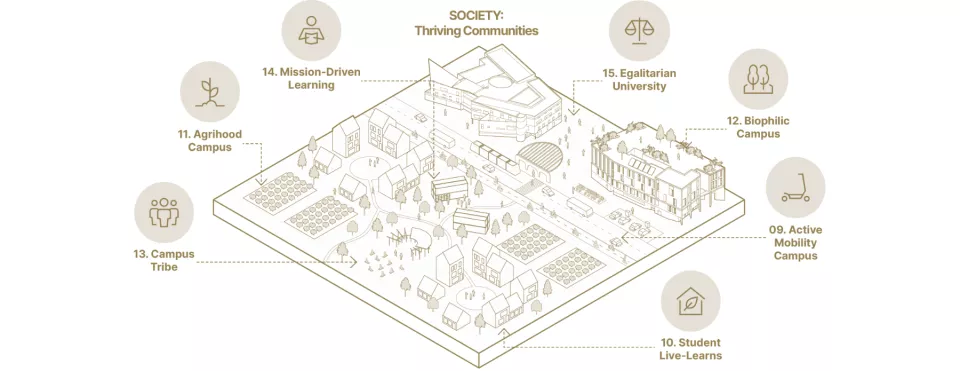
As a university with a diverse and growing campus community, UL has the opportunity to pioneer approaches to co-creating ‘thriving communities’. We acknowledge that the interdependence between humans and natural ecosystems is the basis for sustainable living. UL will aspire to provide equitable access to meaningful opportunity, sustainable accommodation, active mobility, healthy food, quality education, and foster a deep sense of belonging.
By 2030, UL will only provide sustainable forms of transport within and between campuses, with a focus on physical mobility where possible.
The means of transport available within communities has a direct impact on their health, resilience and ecological footprint. This mission sees UL ensure all mobility infrastructure and services available on campus grounds are sustainable and encourage active mobility. In doing so, individuals will have guaranteed access to sustainable forms of transport and active travel when moving on and between campus grounds.
Learn More
By 2030, UL will build student accommodation that integrates the practices, behaviours and infrastructure of sustainable development into the everyday lives of students.
Having a safe and healthy place to live is a foundational human need – it affects all others aspects of our lives. This mission sees UL strive to provide access to high-quality accommodation to learners who seek to learn how to live a sustainable lifestyle. In doing so, learners will be given the opportunity to adopt sustainable behaviours during their time studying at UL.
Learn More
By 2030, the majority of food consumed on UL campus will be healthy and sourced from within the bioregion and/or from the university grounds.
High-quality and sustainably-sourced foods are essential to the health and wellbeing of our community. This mission sees UL act as both a producer and consumer of healthy food, all grown within the Shannon bioregion. This will enable all areas of the campus grounds to promote and provide an abundant selection of nutritious food and drink.
Learn More
By 2030, UL will have integrated nature and natural materials within all campus buildings and environments.
A connection with nature is deeply nourishing for both our body and mind. This mission sees UL continue to strengthen the embodiment of biophilic design principles within the built environment on campus. In doing so, spending time within the diverse spaces on campus will positively impact ones mental and physical health.
Learn More
By 2030, UL will be the national leader for the embedding of equality & inclusion in our structures, opportunities and community.
By taking a whole-institutional approach to inclusion in UL, this mission aims to bring together the entire university community to achieve the goal of becoming a fully accessible, inclusive and diverse institution. To do so, UL will provide an inclusive educational experience through international best practice and attract, retain and develop an excellent and diverse cohort of students, faculty and staff.
Learn More
By 2030, UL will have pioneered mission-driven curriculum to support the transition.
Transitioning to a sustainable society will require a new generation of change-makers. This mission sees UL ensure that relevant sustainability-led theory and associated practices are included in all curriculum. In doing so, each learner that studies at UL will graduate with a sustainability mindset and the capacity to contribute to a more sustainable world.
Learn More
By 2030, UL will foster a place-based identity that embodies a culture of connectedness.
A strong community culture is an essential source of belonging and social connection, and provides the foundation for meaningful collective action. This mission sees UL foster a shared identity that is rooted in a connection to the heritage, culture and vision of the university. In doing so, the UL community will feel united by a core set of values and future aspirations.